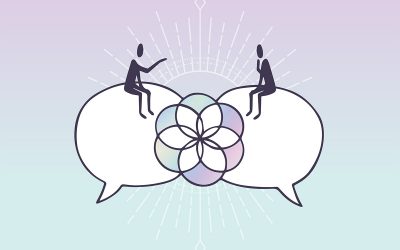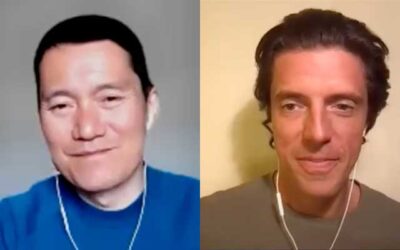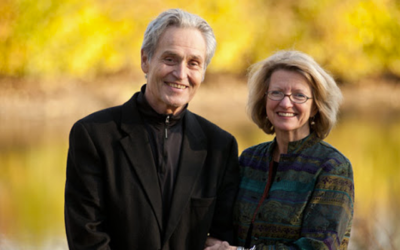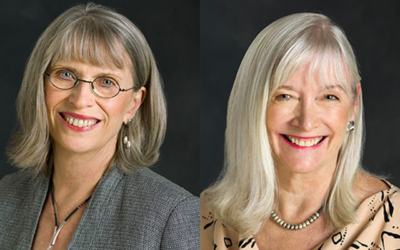I have been reflecting on the power of discovery. Discovery is more than just observation. It is curiosity and engagement. Every moment presents an opportunity to discover what is there.
Often though, we are tranquilized by obviousness.
Imagine yourself always wearing rose colored sunglasses. It would be obvious that the world was rose colored. Every decision made in this context would be influenced by this perspective. Redecorating the house would mean matching everything to this rose colored hue.
The possibility of a different perspective doesn’t exist until you notice the apparatus framing your vision.
My guest today, Bayo Akomolafe, shares a reflection on this shift in perspective:
The obvious is no longer obvious and there seems to be an insurgency of the invisible. The things that we were not able to notice before, because of the architecture of visuality, the regimes of seeing that shape how we notice and appreciate the world, are now coming to the fore. Climate change, transraciality, transcorporeality, interbeing. There is a noticing of entangling threads which suggests that maybe we were never human in the first place.
Everyday interactions are influenced by the unquestioned structure of our mental boxing. There is an implicit obviousness that frames our worldview, at the root of which is our very self concept being human. Discovering this, noticing the box that frames our perception, creates opportunity for a different kind of response.
Today’s conversation explores something Bayo calls post activism. Post activism opens a space of inquiry about the ways that we respond to crisis and invites us to examine places of power in a situation. It is noticing that the solutions that we advance to a problem may, in fact, be part of the problem until we recognize the framing from which we respond.
This is the reason my elders say: the time is urgent, let us slow down. Slowing down is not reducing one’s speed. Slowing down is noticing the others that frame us and then acting upon that framing or the new spaces of power that are opening up.
A father and and self-proclaimed proud diaper-changer, Bayo was invited to be the Coordinator / Special Envoy of the International Alliance for Localization in 2014, a project of Local Futures (USA). He temporarily left his lecturing position in Covenant University, Nigeria to help build this Alliance for a more beautiful world. Bayo Akomolafe (Ph.D.) has been Visiting Professor at Middlebury College, where he taught on ‘transraciality’ (his neo-materialist take on racialization) and postactivism. He has also taught at Sonoma State University (CA, USA), Simon Fraser University (Vancouver, Canada), and Schumacher College (Totnes, England) – among other universities around the world. He is a widely appreciated speaker, teacher, public intellectual, author and facilitator, globally recognized for his poetic, unconventional, counterintuitive, and indigenous take on global crisis, civic action and social change.
This is one of the deepest conversations I’ve had on the show and our explorations are wide ranging. Please enjoy.





Hélène Seegmuller
December 12, 2019I appreciate Lorenz that your questions aiming to find practical answers. Otherwise those discussions would only satisfy our intellect without being seeds of transformations.
Sheryl Morris
January 6, 2020A lot connects here with other learning for me. My own “Monstrous” thinking kicked-in, when I studied for Montessori certification. When some in the Montessori world fixate on her genius alone, my thoughts expand from her. I am far from having all the answers, yet I feel a need to look for answers to complexity and feel compelled to try and share and connect others.
(I have used the word “monstrous” according to my own interpretation, hoping it is not askew.)
I will confess that I don’t understand everything spoken about in the interview with Bayo. I am excited when there are connections between my old and new learning. I read about holistic educations, follow the group Montessori for Social Justice. “Presence” by Senge, Scharmer, Jaworski, Flowers; and Riane Eisler’s many books are current favorites.
I wonder if Bayo is familiar with the term post-humanism and if this indeed corresponds with post-activism? I wonder because nearer the end he talks about the chair we are sitting on having as much to do with how our work goes. (Post-humanism thinking, yes?)
Montessori, herself, felt that there is great untapped human potential; “Man has yet to become conscious of his far deeper responsibilities to a cosmic task,…” In her short book “To Educate the Human Potential” she tells the story of “humbler living things,” such as crinoids and tiny protozoa, which enlisted and served in their simple but mighty ways the work of evolution of the cosmos.
Speaking about how he and his wife are noticing play, seeing children as elders, reminds me a lot of what I read about holistic education: child-centered, self-directed education, and relationships.
There IS a shift in orientation, to “sacred parenthood.” I read about it and help to build a FB community around the various “Pedagogical Paradigms.”
“Be a curious student of your child so you can remain open to their teachings.”––Sandra Fazio
“Colonized and educated alway from his culture in Nigeria and how Wisdoms are pushed aside,” reminds me of learning from members of a special group called Montessori for Social Justice. One member introduced me to “Kindezi: The Kongo Art of Babysitting” in which the authors address, in depth, the problem of encroaching Westernization and its effect on the African traditions of Kindezi, which “provides an extensive amount of services for both the society at large and individual child, making for a cohesive, unified community.” (“Babysitting” is not a mistake in translation, but used to shock us.)
I rather liked his speaking about time being cyclical. From Montessori there is a concept of learning in a spiraling way—new knowledge relatable to what you’ve learned before, yet ever and ever expanding.
I like to think about how, “ We are intragenerational beings.”
“Like layered writings upon each other.”
“A mixture of ancient and that yet to come.”
I found information about Microchimerism, but still looking for the term Holothruant. ??
“We have strong concepts of father, mother, child. Are these too “neat and convenient.”?”
“We are not so easily categorized.”
“Identity can be situated in many grids.”
“DNA generation tests are upending identity, —obvious is no longer obvious. We are noticing the invisible—“
Charles Einsenstien, and Tich Nat Hahn both mentioned.
Still thinking about––“We are perhaps exhausted carrying through what we call being human.”
I am somewhat confused about activism being political or apolitical.
“Activism is part of furniture of modernity.”
“Is the villain part of the plan?” (Heavy thinking!!)
Ask, “What costs are there in victory?”
“Is how we see the problem part of the problem?”
Are our own “solutions” part of the problem? “The road to hell is paved with good intentions.” Good intentions can bring bad results.
Peter Senge writes in “Presence”––“When people who are actually creating a system start to see themselves as the source of their problems, they invariably discover a new capacity to create results they truly desire.”
“Post-activism is sacred activism. Not more spiritual, but protesting with consciousness or intentionality.”
“Comes down to continuous inquiry. Deep inquiry.”
“Hold spaces, in emergence workshops.”
Notice “Where is the power? Open up to other power.” “Grief can be a power, an ally.”
“Other ways of knowing just might sprout.” “Times are urgent, let us slow down, and notice.” “There is “Dramatic power of noticing.”
Greta Thunberg is appealing to our consciences. Appealing to the powers that be: there is futility there, just a reorganizing of the same powers.”
I am a bit taken aback to consider that Greta Thunburg’s work may be futile; but I get it.
Festival next summer in Brazil. Boonja?? Indigenous elders invited!!!!!! Love this!
Where might we be if we had partnered with indigenous people rather than destroying them and their cultures?
One question you had Lorenz was, ”How do you help people notice and cultivate curiosity?” I could only think of my own love of trying to create a sense of awe, curiosity, and wonder about numbers. I developed a supplementary curriculum to do that, after reading and exchanging with Michael S. Schneider author of “The Beginner’s Guide to Constructing the Universe.” It is a way for adults along with their children to see in a different way the numbers 1-10. If interested, I have curated the material at a website http://www.snap-scaffoldingfornumericalsynapses.com
Does it, I ask myself, “Bring people to attention to the structure they are framed in?” I would like to think it is an invitation to see in different ways.
How else do we, “bring people to attention to the structure they are framed in? How do we help to see in different ways?
Riddling? or playing with words?–– As “Stick out your tongue and touch your nose.”?
“Shift cognition, talk about Blind spots. How do we lean into blind spots?” Note to self, see more of (Otto Scharmer “Theory U”) Learning to look out and see differently.
“Not entirely up to us. What do we do? I don’t know. Not about absolutes. Not once and for all. Not an actual. Make space for mistakes. We won’t cross the finish line. —Surrender and sacrifice.”
“Decolonziating is noticing the boxes, the frameworks that contain us.” I’m glad he shared this easy way to understand “noticing our boxes or frameworks!”
I have been reading the work of Riane Eisler and consequently I look and see the patriarchal frameworks/boxes throughout our histories and cultures: man over man, man over woman, adult over child, humankind over nature.
“Being in awe. Know that identities mix. Human agency doesn’t create the world. (Decolonization)
Slow down=notice others that frame us. Doesn’t mean slowing. Forgiveness. Notice the world as a gift. Things are relational. Intra action. We are entangled. Everything is gifted. Some things stabilize. We are always “gifting”. Online medium— Nature is part of culture. Nature is ongoing. Nature/culture. Technology is using us as much as we are using it. We are cyborgs. Lack of depth? Risks and opportunities at same time being online. We are dealing with abstractions. Create spaces and define conditions and boundaries. Make space for everyone, “meet” each one.”
________________________________________
Are there transcripts to your audio? There are several terms I wanted to capture but am having difficulties finding more information. Holothruant?
Some terms/words Bayo used I would like to have, but alas I can not make them out in order to Google them.